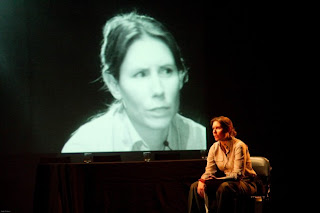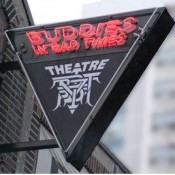bluemouth inc. (Centre for Sleep and Dream Studies) interviews Praxis Theatre (Jesus Chrysler) about local politics, Canadian history, texting in the theatre, and that car called Jesus Chrysler…
 |
| Margaret Evans as Jim Watts in Section 98 at HATCH |
bluemouth: Under strong leadership, PRAXIS has carved a name for itself in Toronto, as a community leader, constantly gathering and reporting creative and political information. I have found myself more than once, clicking over to a link sent to me by PRAXIS Artistic Producer Aislinn Rose on Facebook and enjoy these updates. This kind of journalistic approach must be a lot of work, I wonder how the company manages to keep this ball in the air and how does this day-to-day “open source” idea effect your work creatively?
Michael Wheeler: When Simon and I were in high school we started our own newspaper (The Underground), which ended up replacing Malvern Collegiate’s official newspaper (also called The Undergound) for the 95-96 academic year. That was also the year the school was the only high school in the TDSB to completely shut down for a day of action to protest Rae government tuition increases.
Key to our strategy on that day was a number of actors storming the office with a barrage of questions to distract staff while Simon accessed the PA room at a pre-established time and activated a Rage Against The Machine/Public Enemy mixtape that I had left cued up (to PE’s SHUT EM DOWN) earlier in the morning after doing the announcements. At least ½ the school actually got on a bus or took the TTC downtown to join the few university students protesting a tuition hike that would not impact them personally. [Insert your own analogy about washed up high school sports players trying to re-live their golden years here.]
Aislinn Rose: I love Mike’s answer. Sadly, I was more of the goody goody in high school, supposedly trying to make change from the inside by chairing the Mayor’s Youth Advisory Committee and putting on plays to raise money to build a youth drop-in centre. But I grew up with politics in my home, and though those politics were on the wrong side of the left/right debate at that time (those who know me, know of my shady past campaigning for Perrin Beatty, and working as a political staffer to a Harris Cabinet Minister), I got really interested in current events and social policy in Canada from a young age.
It was great to meet other theatre artists who were interested in uniting their art with their political and social aims, and to try to discover ways of achieving that without becoming particularly partisan. So, reading the news, and staying on top of issues that are important to me, I do that kind of obsessively for the fun of it. Twitter is the biggest distraction to a solid day’s work though, because if you’re paying any attention to that, you’re catching news stories within 5 seconds of them being posted.
Simon Rice: The mixing of theatre and politics has been a natural fit for Mike, Aislinn and myself, as we all love theatre as well as having a passion for politics and social justice issues. I also have a passion for journalism and am currently finishing a post graduate diploma in journalism.
Thinking about the roots of our current theatre project, it comes from the tradition of the American Public Theatre of the 1930’s, where amongst other things existed a project called The Living Newspaper, which tackled prescient social and political issues of the day. It was written by journalists and performed by actors and musicians. This was a time when the theatre was perhaps, (at least in recent history) most relevant to the community. While Jesus Chrysler, isn’t in the same theatrical style as The Living Newspaper, its main character Jim Watts, came from the same theatrical tradition.
bluemouth: I had the privilege of attending your HATCH performance for Section 98 (a much earlier incarnation of Jesus Chrysler), and found the history fascinating, although I know Jesus Chrysler is a long way from what it was in this earlier stage of development. Many of the themes in Jesus Chrysler were echoed this past June during the G20. Have you found that the more you focus on our own history and stories, the more connections the company finds to current events?
 |
|
Margaret Evans as Jim Watts in Jesus Chrysler at Lab Cab
|
MW: We are going to announce the details about this soon, but Praxis is about to start work on a piece that is very specifically about what happened at the G20 in Toronto last summer.
Certainly such shocking disregard for civil and democratic rights in Canada occurring in the middle of creating a piece that considers the history of civil rights here has been odd… It doesn’t take a lot of imagination to see parallels with the Harper and Bennett governments and their disregard for the rights of Canadian citizens whom they disapprove(d) of.
AR: Agreed. I also think that the greater focus of human stories we can relate to increases the ability of the audience to understand why these issues are important… why we should care. Surprisingly, the history around Section 98 of the Criminal Code of Canada isn’t as effective as telling the story of an actual human person. Who knew. Don’t get me wrong though, personally I’m still really interested in that history, and in the dry transcripts of governmental inquiries… but it’s been a great lesson to learn that sometimes I just really like things that are incredibly dull and boring to everyone else.
bluemouth: I enjoyed Margaret Evans performance as Jim Watt’s very much in Section 98, and I am looking forward to seeing her in Jesus Chrysler. Jim Watts certainly was a woman before her time, and it is exciting and refreshing to see a piece centered around a woman who must be viewed very differently today, than she would have been in the 1930’s. This must also present quite specific considerations for a director. How have you approached this as the director?
MW: Ummm, to be honest between playwright Tara Beagan and performer Margaret Evans I feel like the people responsible for this file have a handle on it. As a director, mostly I have been staying out of their way and trying to ensure the story is clear. It’s true that some people would have viewed Jim differently now, but possibly less than we might think.
bluemouth: You mention on the PRAXIS website that when deciding on a playwright “we talked a lot about avoiding a ‘bio pic’. What was it like for the creative process to have playwright Tara Beagan to join the project when she did? And why did Tara rename the piece Jesus Chrysler during your July 2010 workshop?
MW: I don’t know why Tara renamed the show, but I think it was a good idea to do something that made it her own. The practical connection is that Jim Watts owned a Chrysler, which her early theatrical collaborators, The Progressive Arts Club, used to tour South-Western Ontario with a variety of agitprop in the early 30s. They called the car Jesus Chrysler.
In terms of adding Tara to the process, in hindsight the pre-Jesus Chrysler iterations of this project were more akin to ‘staged dramaturgy’. Tara is writing a play informed by this dramaturgy.
She was absolutely the first person I wanted to approach when we decided to begin working with a playwright, as we had worked together on The Fort at York with Crate Productions, which she wrote and co-directed. I was confident already having taken a stab at Canadian history once together in a contemporary non-linear fashion, that Tara would be able to take the story and the theatricality of how we told it to places we would never be able to make it to on our own.
 |
|
Margaret Evans as Jim Watts in Tim Buck 2 (centre) at The Toronto Fringe
|
bluemouth: When I attended the HATCH performance, PRAXIS was really experimenting with live audience interaction via texting. I enjoyed hearing Aislinn sum up what had been sent her way during the performance, and wondered how far the company might be willing to take such digital interaction with an audience. Do you think that PRAXIS would go as far as allowing the fate or narrative of a piece to be determined by the audience during a performance? If so, what kinds of ideas have you come up with so far that would allow for this? This is an interesting question to us, as bluemouth inc. is always experimenting with the audience/performer/piece relationship.
MW: I felt like we were really on to something at HATCH with the instant feedback thing as a workshop tool for shows in development. It is really valuable to get feedback about how an audience is understanding/feeling about a show in real time.
I am also interested in work that is impacted in a more direct way through interaction with the audience. As digital tools become more advanced and pervasive the opportunities for this sort of work will probably multiply. Our HATCH system essentially merged the internet and the fact that most people can text with a cellphone. Much more than that will be possible soon. Maybe Praxis and bluemouth should talk more about this? I would love to make a show that actually turned out a different way each performance and that wasn’t just improvised nonsense.
AR: I would love to see Praxis continue to experiment with different kinds of communication technology and how it can interact with performance, but it needs to be for the right story. As Mike mentioned earlier, a lot of our earlier work with the different iterations of this project felt like staged dramaturgy, which has ultimately been completely necessary to the development process. One of the big things we learned during HATCH was what NOT to do with texting, but it has definitely got us talking about how we can improve upon our ideas in a later project… if the project is right.
SR: In the “wiki-age” the idea of allowing for more direct interaction with the audience is an interesting one. A kind of democratization of the theatre, which in some respects has been traditionally quite dictatorial. But this is not without it’s problems. Of course you want to listen to your audience, but you also don’t want your audience to take on the form of a focus group. So this needs to be explored with care. We probably don’t want our plays to be like choose your own adventure books. The ideal model probably is more of a discussion between the audience and the artists, and from that tension something new can be created. Just as democracy is about much more than holding an election, any movement towards democratizing the process of making theatre, cannot simply be about voting for one plot turn or another.


arrggh want to comment but I’m stuck in rehearsals and can’t get to rhubarb this week! REALLY hope things are bringing new connections together for the work!
only thought after reading this is that it’s not the voices of the audience that might make this kind of thing definitively different from the pre-texting/twittering era — it’s the possibility of the audience pulling in massive amounts of relevant data / imagery into the “social arena” of the performance from the web/their own sources in real time. Opinions have been available to us in theatre since audiences found the courage to stand up and shout back to the stage. Letting the house bring forth their own references and sources of information steps it up. We are all editors of our own encyclopedias.